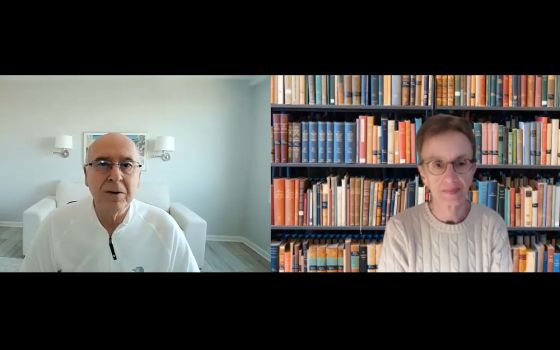
Lent is not about giving up our adult candy or immersing ourselves in pain. Lent is about being honest with ourselves, changing what needs to change in our lives, making our world a better place and growing into the Light. (Unsplash/Dave Hoefler)
Editor's note: This Lent, NCR is holding live spiritual conversations every other week, hosted by our Soul Seeing editor, Michael Leach. Today, join Sr. Joan Chittister at 2:30 p.m. Eastern/1:30 p.m. Central live on YouTube and Facebook for a conversation about Lent during a time of pandemic. The videos are recorded for viewing after the event. Check the Soul Seeing for Lent series page for past conversations.
This is going to be a COVID-19 kind of Lent, and that may be one of the best things that ever happens to our spiritual lives.
COVID-19 landed in the middle of our very busy selves and turned them upside down. The question is, is it all bad? The fact is that COVID-19 managed to do for us what we have not been able to do ourselves. For maybe years now.
Here's the box score.
COVID-19 has stopped our fevered running to and fro, back and forth, in life. And it's all been due to no plans of our own. There are simply places we should not go now. Crowds we should not be with. Trips we cannot take; parties we cannot give; routine things, like getting ready to meet a friend at the library — once so automatic we never gave it a thought — that now include things we can't forget any more. As in, get the mask. (No, not that one, the new one with the wire that holds it up.) Wash the hands again. Sit across the table from a friend rather than beside them. All simple things, daily things, normal things that we have to think about differently now. Where'd I put the extra masks? How many passengers can go in the van? What do you mean, the church is closed?
The result of it all, I have discovered, is life-changing. COVID-19 has reduced us to the essence of ourselves. To the bare bones of our lives. The little things — meet that friend, go to that store, work with the dog running circles in the room — have tapped into the core of us, have shown us our own limitations, our own needs, as no "what-shall-I-give-up-for-Lent" game can ever do.
COVID-19 has also taught us a form of patience. When there is no end date to something, our attention shifts to what's going on now, rather than later. Instead of concentrating on how long it will be till we can get to where we really want to go — since we can't go there anyway — we begin to think about what we might do now. But differently. We begin to ask ourselves a whole new set of questions, in fact. As in, what could be good for me to concentrate on now, that I can do alone? Or, what did we learn in the past about how to live when life stalled and felt dull and empty?
Advertisement
Then, just when we've settled down enough to wait this out, we begin to hear around us the emergence of another whole way of living life.
The woman on the Zoom book club, for instance, put it this way: "You know, when this is over, I'm going to miss these long slow days."
And I myself have said it a little quietly, a bit uncertain about admitting it: "No, I'm not really suffering from the quarantines and lockdowns much. In fact, this is the kind of time and space that I've been wanting for about three years." (And all of this totally unaware of the people now working from home — if they have a job at all — whose work week is more harried than ever, thanks to COVID-19.)
Nevertheless, for many, a good book in hand, a slow walk around the block, the early nights, even the quiet holidays have had a touch of gift this year. And in the middle of it all, there has come the plaguing wonder: Is this the future? And if so, what will that demand of me then?
No doubt about it: This is COVID-19 Lent, 2021. But the real truth is that we get a touch of this kind of time every year — and we either ignore it or chaff under it or pay it not a minute of genuine, personal interest. Instead, unfortunately, we've too often found Lent boring, long, useless, just one more burden in life, something to do that has very little real meaning in life anymore.
And why would we feel that way — if, of course, we ever admitted it? Because we have thought of Lent as everything except what it is really meant to be: space, time, change and reflection.
Lent is meant to be a time out of time — a piece of life dedicated to rethinking all of it. It's time to ask where we were last year at this time and where we are now. Or, most of all, where we want to be. And what do we need to do to get there?
It's the moment to ask myself: Who am I? Who am I becoming? One of the keepers of my own little world, maybe? Have I become the person who walks right by someone I know wants my time and my understanding? Or worse, am I avoiding someone I'm afraid is looking for my help with the daycare program, or is depending on me to pack the parish fish dinners for pick up, designed to keep the school open? Or someone who has been hinting about wanting me to start a program for working mothers? And when will I ever get it figured out in the midst of all the busyness, all the confusion? All the events and engagements modern life has to offer?
Lent is meant to be a time out of time — a piece of life dedicated to rethinking all of it. It's time to ask where we were last year at this time and where we are now. Or, most of all, where we want to be. And what do we need to do to get there?
Lent, up until this one at least, has usually been seen mainly as a period of personal deprivation or simply something more spiritual to do when we already can barely keep up with a daily routine. As a result, it takes on the aura of a hard time. A bad time. A dour time.
And yet, it has also always been, at base, time given to us to straighten things up a bit: our relationships, our outpourings of charity, our concentration on the things that really matter in life. It underscores the presence of the Spirit of Jesus, whose crucifixion calls us always to become more of the best of ourselves, to live forever to the depths of our souls. It is Lent that shows us what's under the superficialities of life and prods us to face them.
Lent, to the holiest and most mystical of us, however much it has been described that way, has never set out to immerse us in pain, in a kind of spiritual masochism. On the contrary, Lent is the one proof we have that the end of everything we face, all the struggles required of us, it is really meant to become new life in us.
But somewhere along the way, the spiritual life — and the practices of Lent, in particular — became more the negation of life than the holy-making embrace of all its dimensions. And yet, at base, Lent leads us to the resurrection of our souls from emptiness of purpose to the model of the self-giving Jesus, whose cross calls us to spend our own lives for the good of others.
It's meant, too, this year, for us to mourn with real grief, of the 500,000-plus families in the U.S. who lost someone to this pandemic, to the heart of God for strength and balm. During World War II, we lost even fewer of the young who were our future. During this war with an unseen virus, we lost so many of the old who were the wisdom of our society. And why? Because as a country we did little or nothing to stop the virus before it got ahead of us. For that disregard, O God, forgive us.
No, Lent is not about giving up our adult candy or immersing ourselves in pain. Lent is about being honest with ourselves, changing what needs to change in our lives, making our world a better place and growing into the Light. It is not about making up strange and useless penances, important as these may be to training us in self-control. It is about doing what needs to be done in these circumstances with a generous heart and an open soul.
When asked the way to eternal life, Jesus told the disciples to "go by the narrow and the hard way" (Matthew 7:14). When Abba Ammonas, a fifth-century desert monastic, was asked, "What is the narrow and hard way?" Ammonas answered, "The narrow and hard way is to control your thoughts and strip yourself of your own way for the sake of God."
Lent leads us to the resurrection of our souls from emptiness of purpose to the model of the self-giving Jesus, whose cross calls us to spend our own lives for the good of others.
Note well: The old monk's response is not about self-flagellation, in other words. Not about fancy penances. Not about severe fasting. Not about public deprivations. "The hard way," Ammonas teaches, is self-control, thought-control, and acceptance of the natural irritations of life. Like pandemics, maybe. Like personal and political struggles, maybe. Like our fear of the future in a world in transition.
If COVID-19 has taught us anything, it is surely the real meaning of what it takes to come to terms with the self and all the self-centeredness that has, like barnacles, invaded our marriages, our work time, our family time, our reading time, and even the kind of personal time that freshens and inspirits our souls.
From where I stand, Lent calls us to take the space and time we need to make the changes of life we need. It's about plotting our own renewal into a more placid, a more regular, a less hectic self. It's about sinking into the kind of personal reflection that brings us to confront the self for which we seek.
Lent is not a spiritual competition, a kind of "no pain, no gain" exercise of the soul. Lent is the time to renew the best in us.







